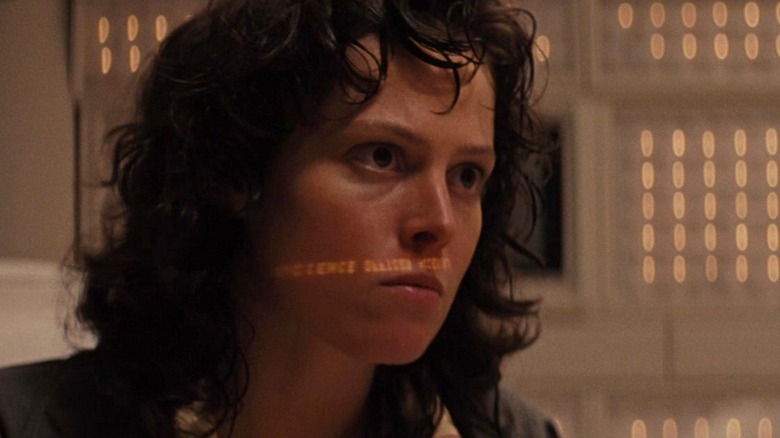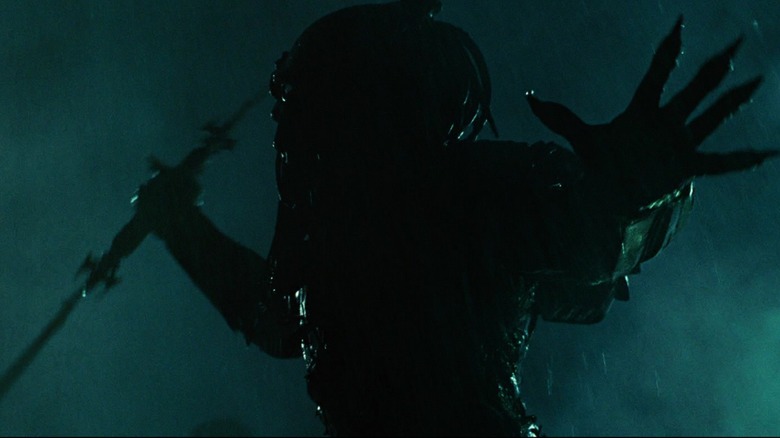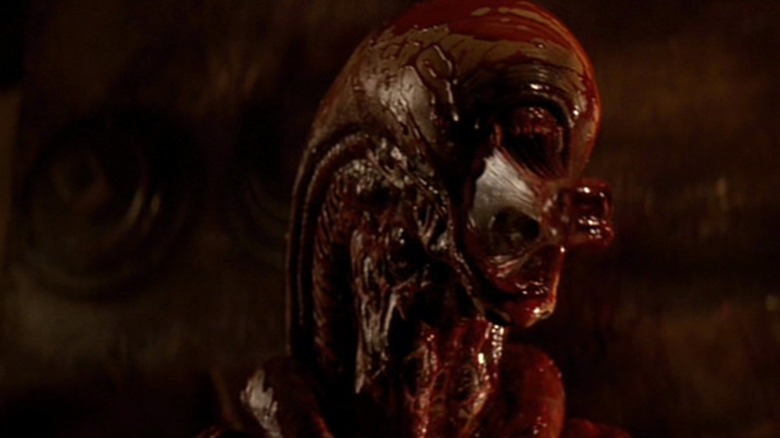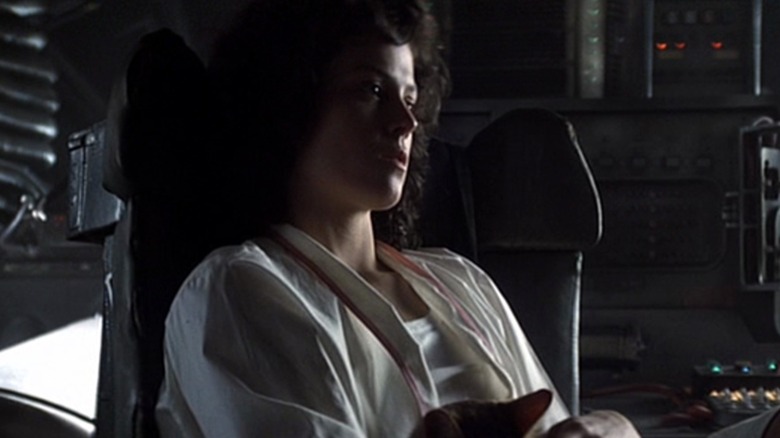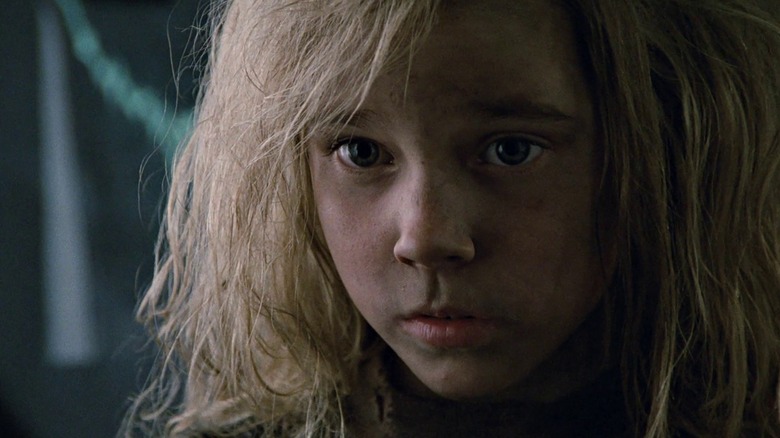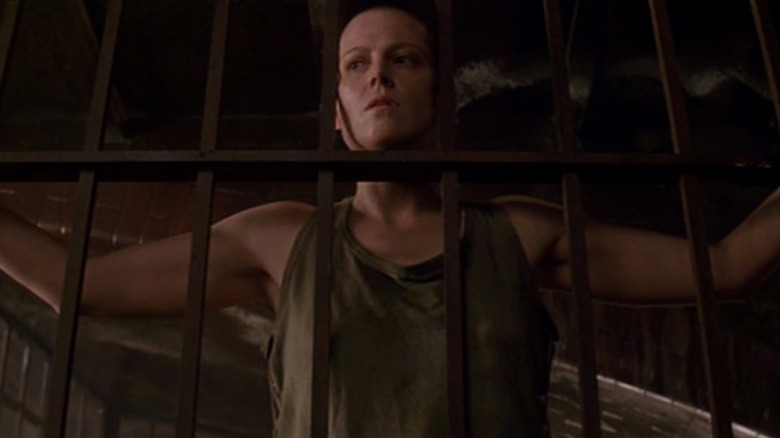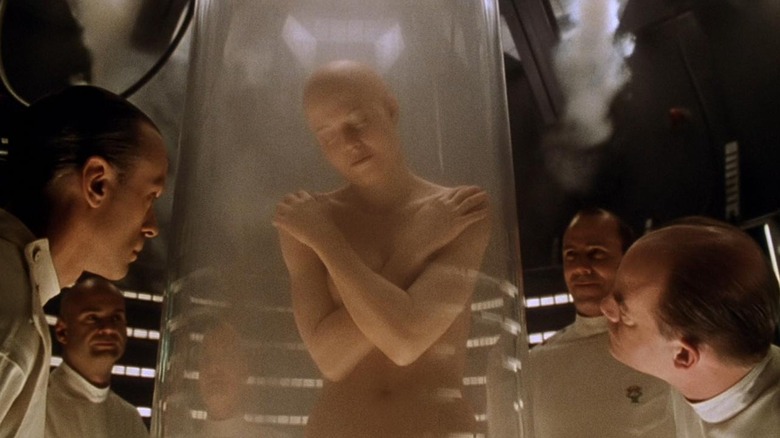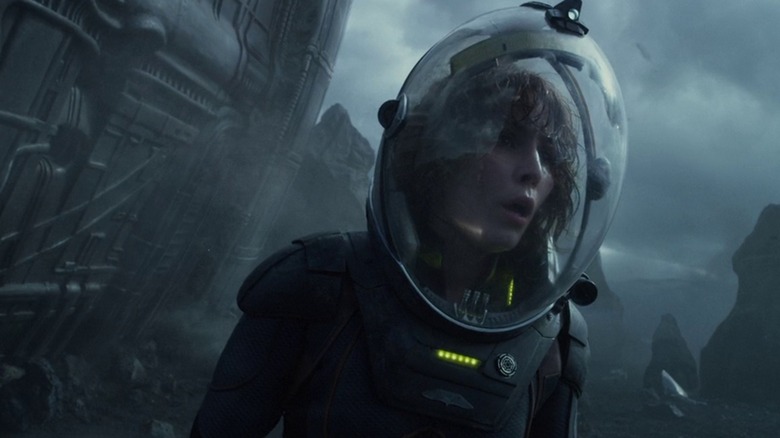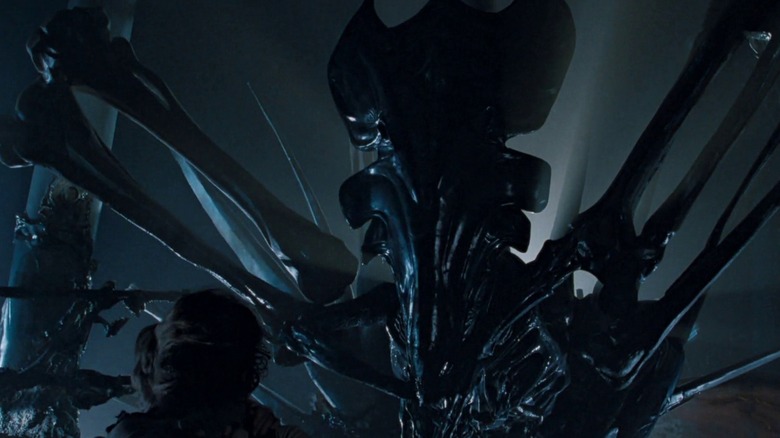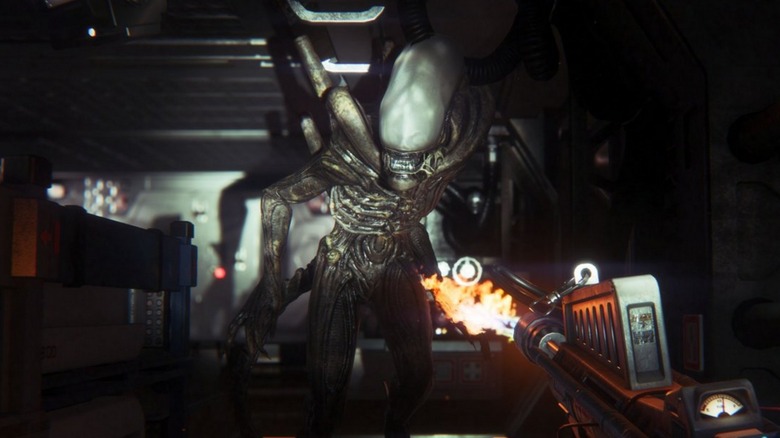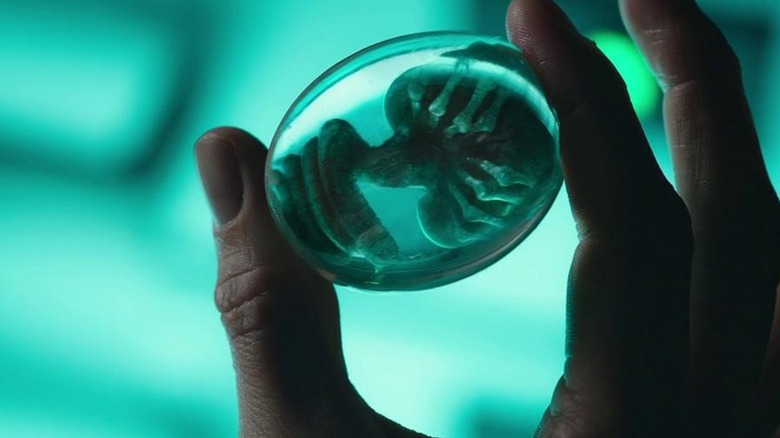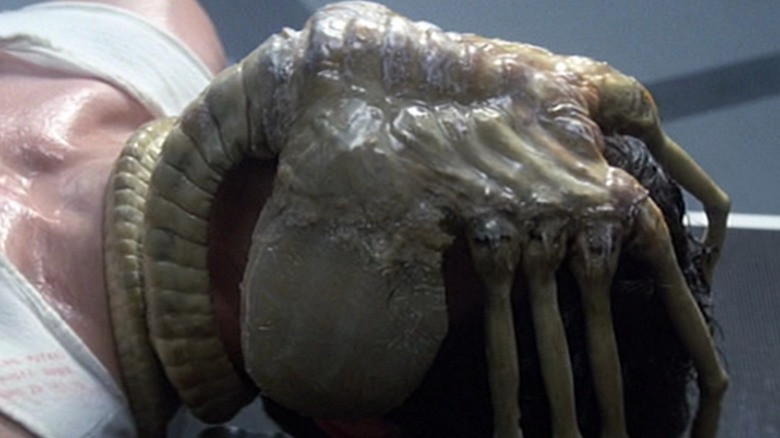We Rewatched The Alien Movies And They're Completely Different Now
In space no one can hear you scream. That iconic tagline introduced "Alien" to audiences in 1979, but since then, "Alien" has become so much more than just a sci-fi horror movie. Fans have gotten sequels, prequels, crossovers, comics, novels, and games — and the franchise just keeps growing.
The "Alien" movies have dominated the box office for decades, and the series is as popular now as it ever has been. 2024's "Alien: Romulus" was a big success that gave us one of the scariest Xenomorph variants in the franchise, and FX's "Alien: Earth" shakes up the franchise by finally bringing the Xenomorphs from the depths of space to the most terrifying location of all: our backyard.
The original "Alien" is nearly 50 years old, so we decided that now is the perfect time to rewatch all the movies in the cycle. We were shocked to discover that after all this time, the entire "Alien" series feels completely different now.
How did humanity not know about Xenomorphs?
When you watch Ridley Scott's "Alien" for the first time, it's pretty clear that the crew of the Nostromo has no idea what kind of trouble they've gotten themselves into. The crew is completely unprepared to deal with the Xenomorph, and they've got to try to learn about the creature while surviving its attack. When you come back to "Alien" after watching all the other movies in the franchise, though, you start to wonder if Weyland-Yutani could have helped the crew of the Nostromo be more prepared.
In "Alien vs. Predator," we learn that Predators have been coming to Earth to fight Xenomorphs in a ritualistic hunt for thousands of years. This special hunt happens once a century, and considering some humans from the movie survive to tell the tale, you'd have to imagine that other human beings have seen Xenomorphs in the past. Wouldn't stories about the Xenomorph have been floating around Earth for a long time?
"Alien vs. Predator: Requiem" actually takes things even further. In that movie, a Predator fights a Xenomorph in modern-day Colorado. The battle causes mass chaos in the town, and there's simply no way that the Xenomorph doesn't make national news. When you rewatch the entire "Alien" series now, you have to pretend the "Alien vs. Predator" movies never happened if you want the mystery of the Xenomorphs to make any sense at all.
Where were all the hybrids hiding?
The original "Alien" movie gave us a single, terrifying creature that's been haunting the nightmares of sci-fi fans ever since. "Aliens" raised the stakes by flooding the film with creatures and introducing a new variant alien: the Xenomorph Queen. Since then almost every "Alien" movie has tried to break new ground by introducing an alternate version of the Xenomorph.
In "Alien 3" we get the dog-Xenomorph hybrid known as a Runner, and in the "Assembly Cut" version of that movie, the dog hybrid was replaced by a ox-birthed Xenomorph. In "Alien: Resurrection" there's a version of Ripley (Sigourney Weaver) infused with Xenomorph abilities, and aliens infused with her DNA running around as well. The "Alien vs. Predator" movies had Xenomorph variants, as did Ridley Scott's two "Alien" prequel films. Then "Alien: Romulus" gave us the utterly spine chilling Offspring, a particularly human-looking Xenomorph.
Each time a movie introduces a new Xenomorph, it raises the stakes for that particular story, but all those variations become a bit of a problem when you look back on the entire series. If it's so easy for Xenomorph DNA to fuse with the DNA of other creatures, then we probably should have been seeing different variants throughout every movie. This is one of those situations where the real-life aspects of making a sequel create some in-universe continuity problems that simply can't be avoided.
Ripley's victory is a bit muted
The original "Alien" ends with Ripley scoring a two-part victory against the Xenomorph. When she blasts the creature out of the airlock, she saves her own life, but she also manages to kill the most dangerous being in the galaxy. Unfortunately, with every new entry in the "Alien" franchise, Ripley's victory gets more and more muted.
Almost 50 years later, "Alien: Romulus" took audiences back to the remnants of the Nostromo. The movie begins with a Xenomorph cocoon being recovered from the ship's wreckage, so now we know that Ripley's fight with the Xenomorph meant next to nothing. She did still save herself, but she failed to stop the Xenomorphs from spreading.
Of course, you could argue that Ripley's victory in the original movie was undercut as early as "Aliens." She defeats one Xenomorph, but in the very next movie we see that hundreds more are still alive. The more "Alien" movies you watch, the more fighting against the Xenomorphs feels hopeless. When you watch the older movies today, you're still rooting for every character to survive, but it's hard not to imagine that humanity is doomed from the start.
The missing plot about Ripley's daughter adds so much
When you rewatch "Aliens" today, you can appreciate an entire subplot and side of Ripley's character that audiences couldn't experience in 1986. Ripley's connection with Newt (Carrie Henn) is one of her driving motivations in the movie, but there's a deleted scene that makes their relationship even more important.
The scene would have come early in the movie, when Ripley is still recovering from her ordeal aboard the Nostromo. Ripley asks Burke (Paul Reiser) for information about her daughter, and Burke breaks the tragic news that she died in her 60s, while Ripley was still in cryosleep. Knowing about Ripley's daughter completely recontextualizes her relationship with Newt. It also adds a new layer of subtext to her epic battle against the Xenomorph Queen, who's really just trying to protect her own children in a way.
Ripley's daughter is an incredibly intriguing character that the movies basically skip over, but other installments in the "Alien" franchise have taken a closer look at her. The game "Alien: Isolation" and its tie-in web series, set just 15 years after the events of the first movie, follows Ripley's daughter Amanda as she investigates what happened to the Nostromo, leading to her own encounter with the Xenomorphs. Now we know that alien fighting is really a family business.
Alien 3 really could have been better
A critical disappointment that underperformed at the box office, "Alien 3" was a low point for the franchise when it opened in May 1992. Rewatching it now is particularly painful because we know just how close we were to getting a truly great threequel.
By 1992 David Fincher had been directing music videos for nearly a decade, but "Alien 3" was his first time helming a feature-length movie. Today Fincher's renowned for movies like "Seven," "Fight Club," and "Zodiac," but the third "Alien" entry made for a rough start to his directorial career. We know now that Fincher has a strong sense of style, and according to Sigourney Weaver, the director would have left his mark on "Alien 3" if the studio had let him.
In a 2024 interview with Deadline, Weaver said, "Well, I could feel that David [Fincher] had to get on the phone and fight every day for us to shoot what he wanted to the next day." She said that by the time Fincher signed onto the project, after "Alien 3" had been in development hell for years, the studio was more focused on saving money than making a quality movie. "They had the great idea to put David Fincher aboard for his first film," Weaver said, "but then not to support the guy was very idiotic." If Fincher would have been given more leeway with the movie, "Alien 3" might be up to par with some of his most celebrated work.
Alien 3 should have been Ripley's end point
As disappointing as "Alien 3" is, when you rewatch the entire franchise, it becomes painfully obvious that David Fincher's debut film should have been the end of Ripley's story. The ending of "Alien 3" turns Ripley into a hero for humanity. She sacrifices herself to prevent there being any chance for the Xenomorphs to reach Earth, giving the last survivor of the Nostromo a worthy conclusion to her story.
Then "Alien: Resurrection" ruins the whole thing. "Alien: Resurrection" takes place 200 years after the end of Fincher's movie, and the plot involves a Xenomorph-empowered Ripley clone smashing her way through aliens like a superhero. Shockingly, the movie has a higher score with critics on Rotten Tomatoes than "Alien 3," but general moviegoers rank it significantly lower.
In discussions online, fans can't help pointing out that "Alien: Resurrection" completely nullifies Ripley's sacrifice at the end of "Alien 3," ruining one of the few good elements in that movie. "Resurrection" took a big swing, but fans didn't appreciate Ripley getting superpowers and becoming a cloned alien hybrid. Sadly that means the official ending of Ripley's story is also now the lowest point in the franchise for many fans.
Offscreen deaths drag the whole series down
There's a bizarre trend in the "Alien" movies that's a little hard to spot unless you watch the movies back-to-back. Multiple entries in the franchise establish a new status quo by killing important characters entirely off screen. We've already talked about how Ripley's daughter lived and died completely offscreen – and in a deleted scene, no less – but that's only the beginning.
"Alien 3" has an even more egregious off-screen death that basically undoes Ripley's victory in "Aliens." Within the first few minutes of the movie, Ripley crash lands on Fury 161, and Newt dies in the crash. Ripley's perfectly set up to go on a brand new adventure, but that comes at the expense of "Aliens" having any weight outside of itself. Many years later, Ridley Scott continued this less-than-stellar trend with his return to the franchise: The ending of "Prometheus" leaves audiences with a massive cliffhanger as Elizabeth Shaw (Noomi Rapce) heads off into space to find the Engineers — but "Alien: Covenant" reveals that Shaw dies before getting any real answers.
All these offscreen deaths help the "Alien" movies tell individual stories that aren't weighed down by all the characters and plots that came earlier in the franchise. Unfortunately, they also make it difficult to really invest in any character in the series besides Ripley.
What about the Alien movies we didn't get?
The "Alien" fanbase is pretty spoiled for content, but if you're really plugged into all things "Alien," it's hard to watch the movies today without thinking about some promising projects that were canceled. It's even possible that some of the greatest "Alien" movies are the ones we'll never get to see.
"Alien 3" famously spent quite a long time in development, which is part of why the film is such a mess. The version of the movie we can all see today was written by David Giler, Walter Hill, and Larry Ferguson, but they weren't the only writers who took a crack at the script. Beloved science fiction author William Gibson wrote his own version of "Alien 3," but we didn't get a look at it until famed writer Pat Cadigan turned the screenplay into a novel in 2021.
In the 2010s, "District 9" and "Elysium" director Neill Blomkamp was supposed to helm a fifth "Alien" movie that would have directly followed "Aliens" while disregarding "Alien 3" and "Alien: Resurrection." Blomkamp's movie never had a full screenplay, and eventually it got put on the back burner when Ridley Scott began working on "Alien: Covenant." Ironically, after "Covenant" opened, Scott canceled his plans to complete the prequel trilogy with another movie called "Alien: Awakening," so we're also left wondering how the story of David (Michael Fassbender), the Engineers, and the black goo truly wraps up.
Video games have given us a new perspective on Alien
Like some other successful sci-fi franchises, "Alien" is more than just a movie series now. There's an extended universe of "Alien" fiction that's full of lore for diehard fans to dive into. Plenty of "Alien" tie-in comic books and video games can deepen your understanding of the franchise, but there's one piece of extended universe media that's guaranteed to change the way you watch the "Alien" movies.
The 2014 game "Alien: Isolation" is a survival horror experience that will burrow into your mind and haunt your nightmares after you play it. The game follows Ripley's daughter Amanda 15 years after the events of the original movie. The story is great and sure to delight "Alien" fans, but the gameplay is the real meat of the experience.
Players need to evade Xenomorphs at all costs, but the creatures are much smarter than your typical video game enemies. As the game progresses, the Xenomorphs learn from your movements and habits, and they'll start anticipating your next hiding place or escape route. After you play several hours of "Alien: Isolation," you get a visceral understanding of the fear that characters in the "Alien" movies face. The next time you watch the films, it's easier than ever to imagine yourself in the protagonists' shoes.
The Alien movies don't make for an ideal marathon
Most people agree that "Alien" is one of the best sci-fi franchises of all time. The high points include some all-time great films like "Alien" and "Aliens," and even the low points like "Alien: Resurrection" have something for sci-fi fans to enjoy. Whether you want sci-fi, horror, action, or plain old schlock that plays like comedy, the "Alien" franchise has you covered. All that variety is what makes "Alien" a truly great series, but it also makes the franchise a bad candidate for a movie marathon.
The tonal shifts throughout the "Alien" movies are more difficult to enjoy when you watch the films back-to-back. It's hard to transition from the ridiculousness of "Alien vs. Predator: Requiem" to the self-seriousness of "Prometheus," for example. The bigger problem with watching all the "Alien" movies straight through, however, is that the full story doesn't make any sense.
An "Alien" mega-marathon makes it painfully clear that the people who wrote and directed each individual movie didn't really care about creating a cohesive universe. The movies are full of lore inconsistencies, and there's nothing approaching a true narrative or thematic throughline in the franchise. Fans often point to "Prometheus" and "Alien: Covenant," which are meant to be prequels to the original "Alien," as prime examples of why the "Alien" lore doesn't really make sense movie-to-movie. The story of the Xenomorphs and the black goo in those films doesn't line up all that well with the original "Alien." For better or for worse, the "Alien" movies make the most sense if you take them each as standalone tales.
The Alien franchise changed movies forever
Part of why watching the "Alien" movies today feels different is because the franchise's influence has stretched incredibly far. "Alien" and "Aliens" alone had a massive impact on sci-fi, horror, and action movies that we can still feel today. The original inspired other gritty movies about the terrors of space like "Event Horizon," while Ripley's groundbreaking role as an action hero in the second film helped pave the way for other sci-fi heroines like Sarah Connor (Linda Hamilton) from "The Terminator" and Jyn Erso (Felicity Jones) from "Rogue One."
The franchise's influence has reached well beyond the movies. Video games have taken some huge bursts of inspiration from the "Alien" universe. You can find direct references to "Alien" all over other games, from the Mother Brain in "Metroid" to the Flood enemies in the "Halo" series. The 2022 horror game "Scorn" especially leaned into its "Alien" influence and created a whole new world inspired by the work of H.R. Giger, the artist responsible for designing the Xenomorph in the first place. Science fiction has been so heavily influenced by the "Alien" franchise that even if you haven't seen the movies themselves, you've almost certainly encountered some elements that were borrowed from the series — and it's not likely to stop.
